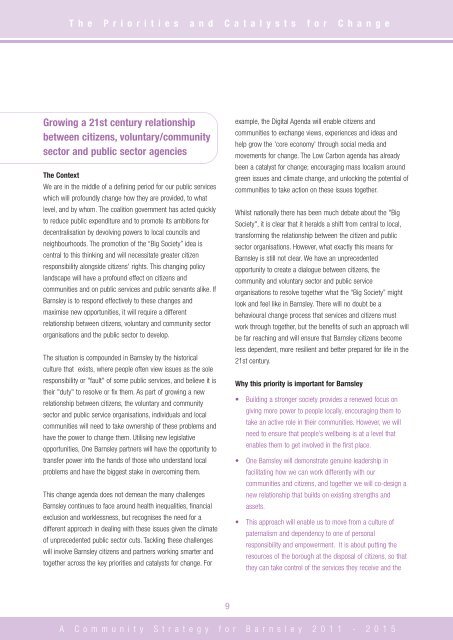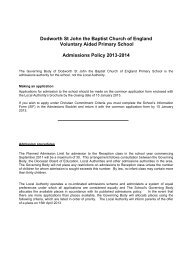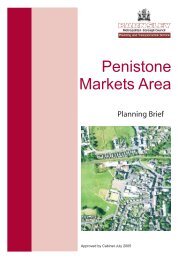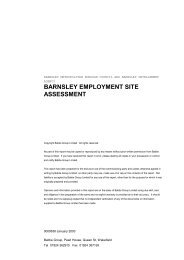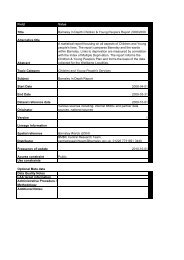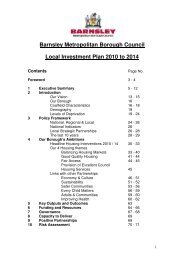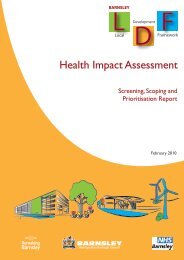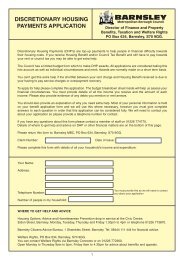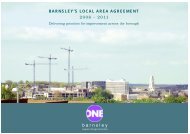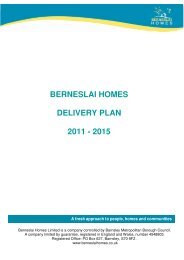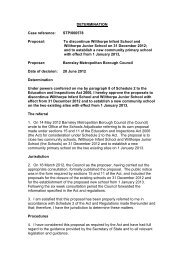A Community Strategy for Barnsley 2011 - 2015 - Barnsley Council ...
A Community Strategy for Barnsley 2011 - 2015 - Barnsley Council ...
A Community Strategy for Barnsley 2011 - 2015 - Barnsley Council ...
Create successful ePaper yourself
Turn your PDF publications into a flip-book with our unique Google optimized e-Paper software.
The Priorities and Catalysts <strong>for</strong> Change<br />
Growing a 21st century relationship<br />
between citizens, voluntary/community<br />
sector and public sector agencies<br />
The Context<br />
We are in the middle of a defining period <strong>for</strong> our public services<br />
which will profoundly change how they are provided, to what<br />
level, and by whom. The coalition government has acted quickly<br />
to reduce public expenditure and to promote its ambitions <strong>for</strong><br />
decentralisation by devolving powers to local councils and<br />
neighbourhoods. The promotion of the “Big Society” idea is<br />
central to this thinking and will necessitate greater citizen<br />
responsibility alongside citizens' rights. This changing policy<br />
landscape will have a profound effect on citizens and<br />
communities and on public services and public servants alike. If<br />
<strong>Barnsley</strong> is to respond effectively to these changes and<br />
maximise new opportunities, it will require a different<br />
relationship between citizens, voluntary and community sector<br />
organisations and the public sector to develop.<br />
The situation is compounded in <strong>Barnsley</strong> by the historical<br />
culture that exists, where people often view issues as the sole<br />
responsibility or "fault" of some public services, and believe it is<br />
their "duty" to resolve or fix them. As part of growing a new<br />
relationship between citizens, the voluntary and community<br />
sector and public service organisations, individuals and local<br />
communities will need to take ownership of these problems and<br />
have the power to change them. Utilising new legislative<br />
opportunities, One <strong>Barnsley</strong> partners will have the opportunity to<br />
transfer power into the hands of those who understand local<br />
problems and have the biggest stake in overcoming them.<br />
This change agenda does not demean the many challenges<br />
<strong>Barnsley</strong> continues to face around health inequalities, financial<br />
exclusion and worklessness, but recognises the need <strong>for</strong> a<br />
different approach in dealing with these issues given the climate<br />
of unprecedented public sector cuts. Tackling these challenges<br />
will involve <strong>Barnsley</strong> citizens and partners working smarter and<br />
together across the key priorities and catalysts <strong>for</strong> change. For<br />
example, the Digital Agenda will enable citizens and<br />
communities to exchange views, experiences and ideas and<br />
help grow the 'core economy' through social media and<br />
movements <strong>for</strong> change. The Low Carbon agenda has already<br />
been a catalyst <strong>for</strong> change; encouraging mass localism around<br />
green issues and climate change, and unlocking the potential of<br />
communities to take action on these issues together.<br />
Whilst nationally there has been much debate about the "Big<br />
Society", it is clear that it heralds a shift from central to local,<br />
trans<strong>for</strong>ming the relationship between the citizen and public<br />
sector organisations. However, what exactly this means <strong>for</strong><br />
<strong>Barnsley</strong> is still not clear. We have an unprecedented<br />
opportunity to create a dialogue between citizens, the<br />
community and voluntary sector and public service<br />
organisations to resolve together what the “Big Society” might<br />
look and feel like in <strong>Barnsley</strong>. There will no doubt be a<br />
behavioural change process that services and citizens must<br />
work through together, but the benefits of such an approach will<br />
be far reaching and will ensure that <strong>Barnsley</strong> citizens become<br />
less dependent, more resilient and better prepared <strong>for</strong> life in the<br />
21st century.<br />
Why this priority is important <strong>for</strong> <strong>Barnsley</strong><br />
• Building a stronger society provides a renewed focus on<br />
giving more power to people locally, encouraging them to<br />
take an active role in their communities. However, we will<br />
need to ensure that people’s wellbeing is at a level that<br />
enables them to get involved in the first place.<br />
• One <strong>Barnsley</strong> will demonstrate genuine leadership in<br />
facilitating how we can work differently with our<br />
communities and citizens, and together we will co-design a<br />
new relationship that builds on existing strengths and<br />
assets.<br />
• This approach will enable us to move from a culture of<br />
paternalism and dependency to one of personal<br />
responsibility and empowerment. It is about putting the<br />
resources of the borough at the disposal of citizens, so that<br />
they can take control of the services they receive and the<br />
9<br />
A <strong>Community</strong> <strong>Strategy</strong> <strong>for</strong> <strong>Barnsley</strong> <strong>2011</strong> - <strong>2015</strong>


